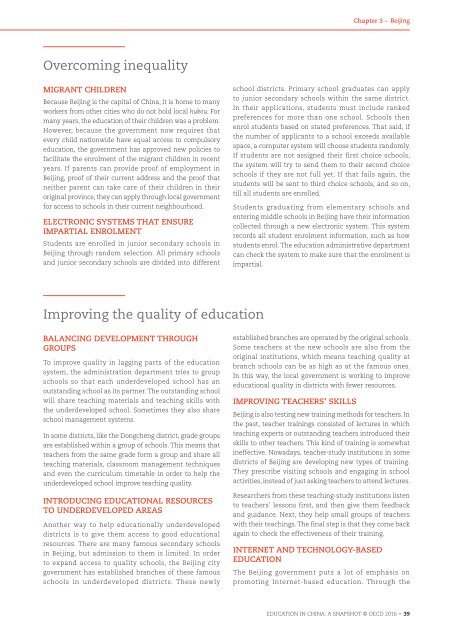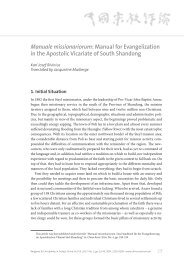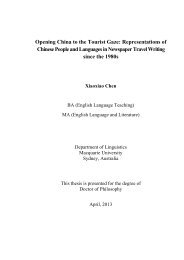EDUCATION IN CHINA
Education-in-China-a-snapshot
Education-in-China-a-snapshot
Create successful ePaper yourself
Turn your PDF publications into a flip-book with our unique Google optimized e-Paper software.
Chapter 3 – Beijing<br />
Overcoming inequality<br />
MIGRANT CHILDREN<br />
Because Beijing is the capital of China, it is home to many<br />
workers from other cities who do not hold local hukou. For<br />
many years, the education of their children was a problem.<br />
However, because the government now requires that<br />
every child nationwide have equal access to compulsory<br />
education, the government has approved new policies to<br />
facilitate the enrolment of the migrant children in recent<br />
years. If parents can provide proof of employment in<br />
Beijing, proof of their current address and the proof that<br />
neither parent can take care of their children in their<br />
original province, they can apply through local government<br />
for access to schools in their current neighbourhood.<br />
ELECTRONIC SYSTEMS THAT ENSURE<br />
IMPARTIAL ENROLMENT<br />
Students are enrolled in junior secondary schools in<br />
Beijing through random selection. All primary schools<br />
and junior secondary schools are divided into different<br />
school districts. Primary school graduates can apply<br />
to junior secondary schools within the same district.<br />
In their applications, students must include ranked<br />
preferences for more than one school. Schools then<br />
enrol students based on stated preferences. That said, if<br />
the number of applicants to a school exceeds available<br />
space, a computer system will choose students randomly.<br />
If students are not assigned their first choice schools,<br />
the system will try to send them to their second choice<br />
schools if they are not full yet. If that fails again, the<br />
students will be sent to third choice schools, and so on,<br />
till all students are enrolled.<br />
Students graduating from elementary schools and<br />
entering middle schools in Beijing have their information<br />
collected through a new electronic system. This system<br />
records all student enrolment information, such as how<br />
students enrol. The education administrative department<br />
can check the system to make sure that the enrolment is<br />
impartial.<br />
Improving the quality of education<br />
BALANC<strong>IN</strong>G DEVELOPMENT THROUGH<br />
GROUPS<br />
To improve quality in lagging parts of the education<br />
system, the administration department tries to group<br />
schools so that each underdeveloped school has an<br />
outstanding school as its partner. The outstanding school<br />
will share teaching materials and teaching skills with<br />
the underdeveloped school. Sometimes they also share<br />
school management systems.<br />
In some districts, like the Dongcheng district, grade groups<br />
are established within a group of schools. This means that<br />
teachers from the same grade form a group and share all<br />
teaching materials, classroom management techniques<br />
and even the curriculum timetable in order to help the<br />
underdeveloped school improve teaching quality.<br />
<strong>IN</strong>TRODUC<strong>IN</strong>G <strong>EDUCATION</strong>AL RESOURCES<br />
TO UNDERDEVELOPED AREAS<br />
Another way to help educationally underdeveloped<br />
districts is to give them access to good educational<br />
resources. There are many famous secondary schools<br />
in Beijing, but admission to them is limited. In order<br />
to expand access to quality schools, the Beijing city<br />
government has established branches of these famous<br />
schools in underdeveloped districts. These newly<br />
established branches are operated by the original schools.<br />
Some teachers at the new schools are also from the<br />
original institutions, which means teaching quality at<br />
branch schools can be as high as at the famous ones.<br />
In this way, the local government is working to improve<br />
educational quality in districts with fewer resources.<br />
IMPROV<strong>IN</strong>G TEACHERS’ SKILLS<br />
Beijing is also testing new training methods for teachers. In<br />
the past, teacher trainings consisted of lectures in which<br />
teaching experts or outstanding teachers introduced their<br />
skills to other teachers. This kind of training is somewhat<br />
ineffective. Nowadays, teacher-study institutions in some<br />
districts of Beijing are developing new types of training.<br />
They prescribe visiting schools and engaging in school<br />
activities, instead of just asking teachers to attend lectures.<br />
Researchers from these teaching-study institutions listen<br />
to teachers’ lessons first, and then give them feedback<br />
and guidance. Next, they help small groups of teachers<br />
with their teachings. The final step is that they come back<br />
again to check the effectiveness of their training.<br />
<strong>IN</strong>TERNET AND TECHNOLOGY-BASED<br />
<strong>EDUCATION</strong><br />
The Beijing government puts a lot of emphasis on<br />
promoting Internet-based education. Through the<br />
<strong>EDUCATION</strong> <strong>IN</strong> CH<strong>IN</strong>A: A SNAPSHOT © OECD 2016 – 39





